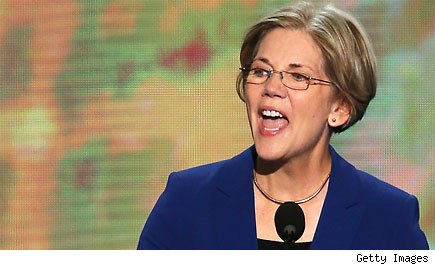When Barack Obama became president in November 2008 he embodied
both the hopes of liberal Democrats looking for a more assertive leadership
after the Clinton years, and of black Americans who saw it as a major step
forward in the realisation of full civil rights. Six years on, both groups have to some extent
been disappointed. The current riots inFerguson, Missouri may have specific local causes but they also represent an
on-going, wider disconnection that exists in much of America between black
communities and law enforcement agencies.
The Ferguson riots are still playing out, so any conclusions from them
must wait. Liberal Democrats, however,
may already consider that six years of unrequited love from the Obama White
House make a new political direction imperative. Step forward Massachusetts Senator Elizabeth
Warren.
For those disappointed with the political tenor of the Obama
administration as a liberal government, Elizabeth Warren provides an admirable
lightning conductor. She ousted
Republican Scott Brown from what had been Ted Kennedy’s senate seat, and she
says the things about taxes and poor families that many ordinary Democrats
firmly identify with.
Take this clear challenge to that standard right-wing notion
that self-made people get where they are without the help of the state:
"There is nobody in this country
who got rich on his own. Nobody. You built a factory out there? Good for you.
But I want to be clear. You moved your goods to market on the roads the rest of
us paid for. You hired workers the rest of us paid to educate. You were safe in
your factory because of police forces and fire forces that the rest of us paid
for. . . . Now look, you built a factory and it turned into something terrific,
or a great idea? God bless! Keep a big hunk of it. But part of the underlying
social contract is you take a hunk of that and pay forward for the next kid who
comes along."
Given that President Obama has proved
relatively Clintonian on fiscal issues then, Elizabeth Warren represents a
useful counterpoint who may not be a presidential candidate herself – she has
publicly declared for Hilary Clinton – but who could act as a liberal
counter-weight to a Hilary candidacy, and a rallying point for the Democrat
liberals.
Michael Tomasky provides a cogent
assessment of Warren’s position in his review of her autobiography in the
current edition of “Foreign Affairs”, and while he concludes that the Democrats
are not as ideologically riven as the Republicans, the policy debate is out there
and Warren’s presence gives it fire.



No comments:
Post a Comment